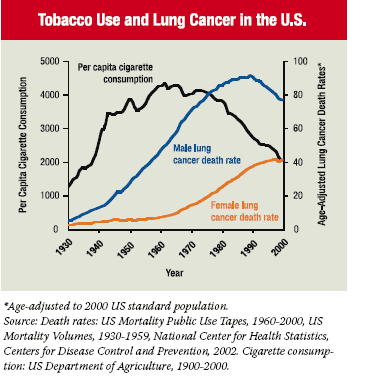
An Important Moment in the Battle Against Lung Cancer
 In our daily efforts to understand and deal with the mysteries of cancer, there are moments that remind us of the urgency of the problem. The recent death of ABC News anchor Peter Jennings from lung cancer and the diagnosis of Dana Reeve, widow of actor Christopher Reeve, with the same disease have brought renewed public attention to the cruel reality that lung cancer kills 160,000 of our friends and family members each year. They remind us of the damage done by smoking, but also that the problem is more complex, and that smoking is not the sole cause of lung cancer. In addition to prevention, we must also urgently address earlier detection and better treatment.
In our daily efforts to understand and deal with the mysteries of cancer, there are moments that remind us of the urgency of the problem. The recent death of ABC News anchor Peter Jennings from lung cancer and the diagnosis of Dana Reeve, widow of actor Christopher Reeve, with the same disease have brought renewed public attention to the cruel reality that lung cancer kills 160,000 of our friends and family members each year. They remind us of the damage done by smoking, but also that the problem is more complex, and that smoking is not the sole cause of lung cancer. In addition to prevention, we must also urgently address earlier detection and better treatment.
We have had important successes against lung cancer. Effective antismoking programs are available, and we are testing more sensitive methods of detection, as well as learning more about genetic mutations that can improve our application of emerging targeted therapies for non-small-cell lung cancer. But the number of deaths tell us we must do more and do it rapidly.
Two years ago, NCI created the Lung Cancer Integration and Implementation (I2) team. The Lung Cancer I2 team - composed of NCI staff and extramural researchers and led by Dr. Margaret Spitz, chair of the Department of Epidemiology at the University of Texas M.D. Anderson Cancer Center - analyzed NCI's lung cancer portfolio; inventoried our lung cancer investments; designated priority areas; and formulated recommendations to accelerate, synergize, leverage, and expand our efforts against lung cancer.
The recommendations - accepted and now being adopted - are focused on three critical strategies: achieving more effective tobacco control, improving early detection and treatment of precancer and established cancer, and developing novel targeted therapies. This approach will be supported by existing initiatives in genomics and proteomics, in vivo imaging, and biorepositories and tumor biology.
A central component of the I2 recommendations is to ensure that we leverage wherever possible existing programs and public-private partnerships, both to improve efficiency and to recognize cost savings. In that regard, several large clinical trials, such as the Prostate, Lung, Colorectal and Ovarian Cancer Screening Trial, and the work of the NCI Integrative Cancer Biology Program, the Lung Cancer Specialized Programs of Research Excellence, and our National Lung Screening Trial will play vital roles.
Within the three focus areas are specific recommendations for priority areas of investigation along the discovery-development-delivery continuum. Within tobacco control, for example, the I2 team recommended that discovery focus on research into areas such as the genetics of nicotine addiction and nanoparticles for drug delivery, while delivery should focus on improving existing behavioral interventions for smoking cessation.
Importantly, the I2 team also recommended a business plan for managing the Lung Cancer I2 enterprise, complete with a scientific advisory committee and senior program director who would report to the NCI Director and Executive Committee.
I would like to congratulate the Lung Cancer I2 team for their work. Their recommendations provide not only a plan, but a pathway to our goal. Each step along that path will be measured by lives saved.
Dr. Andrew C. von Eschenbach
Director, National Cancer Institute
|